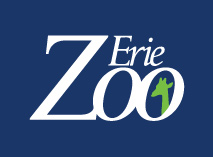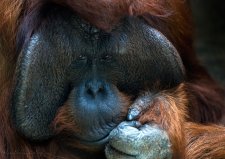Joe's Story
Joe’s Story - One year since we said goodbye…
Anyone who has visited the Erie Zoo since 2002 when Wild Asia opened for the first time couldn’t help but be immediately taken with the resident male Bornean orangutan, Joe. Over the years Joe not only captured the hearts of many staff and volunteers, but also the Erie community at large.
Joe was a gentle giant who loved to come out into his habitat every morning with a loud, swinging greeting and spend his days wrapped in his blanket at the window visiting with his guests.
“[Orangutans] are challenging, but that’s what makes them so special. [With Joe] you got a ‘good morning’ every morning, and every night before turning off the light, you had to say good night and see you tomorrow. With the training, he and I just clicked. No matter what I asked him, and even at the end when he wasn’t feeling well, he would still do whatever I asked him to,” said Lisa Rekitt, Erie Zoo Animal Keeper.
Orangutans are a species that share 97% of DNA with human beings, which is probably why our orangutan exhibit consisting of Joe (adult male), Dasa (adult female), Leela (first offspring, now located at the Toledo Zoo), Ollie (second offspring, now located at the San Francisco Zoo under the name Berani), and Otis (current offspring at the Erie Zoo), has been a popular hangout (pun intended) over the years. Though these animals have so many human-like qualities, it is important to remember that they are in fact animals, and still possess a lot of wild species instincts.
In late winter of 2022, Joe started displaying some abnormal behaviors that were concerning to the zoo team. Orangutans as a species are known to show little evidence of their maladies until the condition has progressed to a moderate or severe level. Therefore, when unusual behaviors were identified, the zoo team jumped into action.
At the time, Joe only showed mild symptoms of lethargy, lack of appetite, and lack of engagement. His care team knew there was something seriously amiss with the usually sociable primate. Thankfully, over the many years he called the Erie Zoo home, his keepers and vet team developed a strong rapport with Joe and our other orangutans, who became comfortable participating in their own medical examinations and health checks. The care teams are able to perform many voluntary medical evaluations like blood draws, blood pressure readings, hand injections, chest auscultations, and one-lead heart monitoring (EKG) with a KardiaMobile device.
Despite an array of testing and various treatments, Joe showed little improvement. We knew we had to act fast. The Erie Zoo’s lead veterinarian at the time, Dr. PJ Polumbo, was able to keep Joe stable while she pulled out all the stops seeking advice from the Association of Zoos and Aquariums (AZA), Orangutan Species Survival Plan (SSP), and the Great Ape Heart Project, who employ great ape experts from around the world.
Working directly with Dr. Nancy Lung, veterinary advisor for AZA’s Orangutan SSP, it was decided extensive testing was necessary to pinpoint what was going on with Joe. Our theory was a heart condition, as is common with great apes at their median life expectancy like Joe, who was 36 years old. Other potential causes included respiratory disease, gastrointestinal disease and neoplasia. After careful consideration, the team deemed it too risky to transport him on a long drive to a center that had these advanced diagnostic tools, so we needed to adapt so these tests could be done on-site.
After a lot of phone calls, discussions, and assistance from many friends of the zoo, a careful plan was made to anesthetize Joe after normal zoo hours to perform testing and bring in a group of experts to assist with diagnostics.
On March 17th, 2022 the plan came to fruition. We compiled an expansive team consisting of veterinarians, orangutan experts, cardiologists, radiologists, technicians, and more. The procedure was led by Dr. Polumbo (Erie Zoo) and Dr. Selig (Cleveland Metroparks Zoo). Thanks to Vantage Mobile Services, Joe did not need to be transported off site for high-level imaging services. Vantage brought a mobile CAT scan unit on site, significantly minimizing the amount of time Joe would need to be under anesthesia.
Post CAT scan, Joe was moved into a building to perform the remainder of the procedure which included an echocardiogram, electrocardiogram, and additional blood work. He also received an Implantable Loop Recorder (ILR) to actively monitor his heart rhythm and rate.
The procedure went smoothly with quick and thorough work by all teams involved. Sadly, it was concluded that Joe was suffering from cardiac disease and plans were immediately put into action to begin treatment.
Joe recovered well from his procedure surrounded by his keepers who continued to provide intensive care and attention. Unfortunately, a couple days later Joe succumbed to the extensive damage that had already been done to his heart pre-procedure and we lost a beloved member of our Erie Zoo family. The staff, volunteers, and community were devastated by his loss and his absence is still met with heavy hearts today.
Despite this sad ending, beautiful developments arose from Joe’s story. His legacy lives on – In summer of 2022, our team was asked to give a presentation at the Association of Zoos and Aquariums (AZA) Orangutan SSP Husbandry Workshop about Joe and his impact on great ape heart research, specifically with orangutan species studies.
“One thing Dr. Nancy Lung (Orangutan SSP) said that will always resonate with me is when she started her presentation with “Let’s go over everything the Erie Zoo did right.” That meant a lot. We had already done amazing diagnostic work through our training with Joe, but once we exhausted all of our avenues, we knew we had to contact additional great ape and medical experts to bring in more resources. We reached out to them to assist - we didn’t assume that we knew it all. It wasn’t just because Joe was a great ape, but because he was a valuable member of our zoo community and we wanted to give him the best care we could,” said Rekitt. “He impacted the orangutan community because you couldn’t look at him and say something was wrong with him. Heart disease really is a silent killer. Researchers don’t know if it’s hereditary, which is why we started Otis (Joe & Dasa’s 5 year old male offspring) on his training right away. Our hope is that we can help the orangutan community from what we learned. The orangutan community is a great group of people and they all help each other. They want to do what's best for the species. They were all extremely supportive.”
Due to the extensive monitoring and testing done with Joe over the years, combined with the diagnostic information gathered during and post procedure, Joe’s case is one of the most thorough cases the Great Ape Heart Project has ever received. This means progress and hope for the future treatment and understanding of great ape species like Joe.
The Great Ape Heart Project (GAHP), founded at Zoo Atlanta, is dedicated to coordinating and studying a clinical approach which targets cardiovascular disease across the four non-human great ape species: gorillas, orangutans, chimpanzees, and bonobos. Recent studies have shown that cardiovascular diseases have been identified as one of the leading causes of mortality and morbidity in great apes, like the Bornean orangutan.
The details Joe’s case was able to provide is invaluable. “We've known there is a gap in cardiac data on orangutans within the Great Ape Heart Project (GAHP), a program that the Orangutan Species Survival Plan (SSP) encourages all zoos to participate in. Joe’s medical case is critical to helping bridge that gap in knowledge. Not only will his contribution aid in our understanding of orangutan cardiac disease but it will potentially help assess and treat other orangutans regionally and globally,” Megan Elder, Orangutan SSP Coordinator.
Since Joe’s procedure, a number of great apes have successfully received Implanted Loop Recorders to assist in the ongoing advancement of cardiac research in great ape species.
“Hopefully we can help other zoos across the country to learn how simple it is to get these KardiaMobile [EKG] readings. And especially with the ones that do have issues, the sooner they can get the Implantable Loop Recorder, it can give a lot of pertinent information,” stated Jenn Salandra, Erie Zoo Curator.
Joe’s mate, Dasa, and their offspring, Otis,reside at the Erie Zoo and have adapted well since his absence. They were kept behind the scenes throughout the whole process and because they witnessed the events from beginning to end, they were able to manage the transition peacefully.
“We cannot believe all that Dr. Polumbo organized. The Erie community, the different hospitals, and different organizations who helped us - those people will never know how much it meant to us,” reflected Rekitt. “These are not our animals. They belong to the folks of the City of Erie. Our job is to take care of them the best that we can.”
Though Joe is missed every day here at the zoo, we are proud to have been able to work with him and to know that his life is making a greater impact on the world and his species’ conservation. We may have a world without Joe now, but we take heart knowing that Joe lives on through the information he provided that aids great ape species not only in North America, but across the world.
If you’d like to learn more about Joe’s journey, please read the press releases issued throughout the process posted at www.eriezoo.org/news. Additionally, if you would like to contribute to the future of orangutan species conservation and the advancements in the Erie Zoo’s orangutan medical equipment, you can make a cash donation to the Joe Memorial Box in the Orangutan Building at your Erie Zoo.
A special thank you to all those who were instrumental in helping Joe and furthering the impact of his life: Dr. PJ Polumbo, Zoie Barber and Ashley Kuhn (Erie Zoo veterinary team), Dr. Nancy Lung Marietta Danforth, Dr. Ilana Kutinsky, Dr. Bill Devlin, and Dr. Stuart Aronson (Great Ape Heart Project), the Great Ape Heart Project team, Dr. Mike Selig and Taylor Borsz (Cleveland Metroparks Zoo), Dr. Kurt Volle (Buffalo Zoo), Dr. Karl Schwarz, Dr. Ehab Eassa, and Diana Schwartz (University of Rochester Medical Center), Dr. David Strasser (Cardiologist), Dr. Madhurmeet Singh (Cardiologist & Electrophysiologist), Joseph Thompson (RN - Sonographer), the UPMC Hamot team, Greg Morganti and John Burchard (Medtronic), Jason Hoover, Tim Hoover, Sarah Oldack, Susan Santiago, David Colatruglio, and Vantage Mobile Services (Vantage Mobile Services), Dr. Sushan Han (Orangutan SSP), the Orangutan SSP team, Dr. Matthew Thomas (Radiologist), Chris Clark, Monica Lewis, and the AHN Saint Vincent team, David Rougeux (Keystone Electric), Dr. Stephanie Melillo and the Mercyhurst University Forensic team, Dr. Kami Fox (Fort Wayne Kids Zoo), Cindy Cossaboon (Denver Zoo), Jeff Beach and Brian Waugaman (Erie Zoo Board of Directors), Lisa Rekitt, Jenn Salandra, Roo Kojancie, Kim Gasper, Dar Gordon, Lisa Zeigler, Seth Lorei, Frank Schulz, John Rhea, Heather Gula, Emily Smicker, Amie Fritz, Scott Mitchell and the Erie Zoo team (Erie Zoo), and all of Joe’s former keepers and care staff. Finally, a big thank you to our community for their generous outpouring of support.






